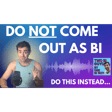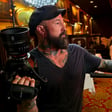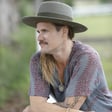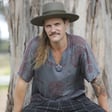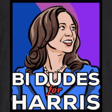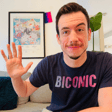Introduction to the Special Episode
00:00:13
Speaker
Welcome to this special episode of Two Bye Guys, the best of 2024, a little clip show. I saw other people doing this and wasn't going to, but then suddenly decided, why not? Let's do that. I want to do that. ah These are not necessarily the best clips of 2024. How could I possibly pick the best? I love all my guests equally. But these are just some clips that I found recently that really resonated with me that I've been thinking about a lot and that I thought might be nice for you all to reflect on as we move into 2025. Two bye guys, bye one bye guy, will be back in 2025 very soon, probably by the end of January.
New Podcast Direction in 2025
00:00:55
Speaker
I'm thinking of trying a new thing this season, which is not having a strict schedule, ah just recording and posting when it's in flow for me, like I am doing
00:01:07
Speaker
today, on a Tuesday, or maybe you'll hear this Wednesday. I'm not even sure. I don't know when I'll post it. I'm just gonna do what feels right. ah Usually I do about two seasons per year, about 20 episodes, so I'm still gonna aim for that, but maybe just on a less regular schedule. I did weekly episodes last season, I think earlier in the year, bi-weekly. I'm gonna just try it whenever it feels right.
00:01:31
Speaker
So let me know what you think. If that really messes up your listening schedule and it's a terrible idea, let me know. But I think it might work.
Impact of Plant Medicine on Life and Identity
00:01:39
Speaker
We'll see. I've also been on a plant medicine journey this year. That feels like the big change in defining new addition to my life in 2024. And I'm excited to keep that journey going in 2025.
00:01:51
Speaker
I only mention it because it feels so connected to all the work that I've been doing here. It's been really amazing and really healing, but it feels so connected to the podcast, to my book, to my coaching practice. So it's going to be intertwined into what we talk about here. It also feels very connected to my queerness in general. It feels connected to my spirituality, my Judaism, although the spirituality of the plant medicine is definitely non-denominational.
00:02:20
Speaker
I have felt like I've connected with a higher power, but it is a singular higher power. It doesn't matter what religion you are. It's something we can all tap into. It's been really transformative for me. ah The plants have really confirmed for me that gender is a contract. Sexual fluidity is totally normal and natural, and that everything flows from love. And I know we all have to get there ourselves. I don't want you to just take my word for it.
00:02:50
Speaker
But it does feel for me to share my experience like for the past 10 years, I've been reflecting, going to therapy, learning, studying, doing group work, building up this framework in my head about how the world is and how I want the world to be and what my place is in it. And it's all been making a lot of sense in my head. And now the plant medicine has finally allowed me to actually step into that world for real.
00:03:18
Speaker
to feel the truth of that framework in my body, ah to have confidence in that vision, to quiet the doubts and the worries that I often have. ah So this is something you're working on, feeling things that that you know in your head and feeling them in your body.
00:03:36
Speaker
ah That's definitely something I'll be talking more about on this podcast. It's also something we can talk about in coaching or on a coaching call and feel free to ask me about plant medicine and I can tell you about the power of that. A few quick announcements before
Launching New Coaching Offerings
00:03:50
Speaker
we get into it. I am working on some new coaching offerings in 2025. My practice has got off to an amazing start in 2024. I love doing this work. It's really fulfilling and I'm finding it's coming more and more naturally I'm leaning into my intuition. I've loved the process and seeing my clients make so much progress. ah You can check out some new testimonials on my website, robertbrookscohen.com slash coaching, see what other people have experienced. I've been receiving coaching as well and learning a lot from that. That's been a wonderful journey. I really do think coaching can be so powerful. Whatever you want to work on, having someone to talk to and having accountability is so helpful. It makes sure that you move forward and you don't stay still. So I am working on some things I've been learning about from my other coaches. I'm working on an email course that will be available soon as well as an asynchronous coaching model that I participated in. It was really helpful for me. So stay tuned for some new coaching offerings in 2025. But the ultimate, the most value is still the one-on-one sessions with me. Right now I have about eight active clients I have bandwidth for about 10.
00:05:02
Speaker
So I've been running a holiday special on individual coaching. My pricing was set to go back to normal in 2025. But since I've got room for two or three more clients right now, I'm going to extend that pricing for a little bit longer if you book an intro call with me anytime between today and January 10th. I will honor that pricing. And you can see that pricing on my website, robertbrickscohen.com. So if you're listening to this on time and you've been thinking about doing a call with me, now's the time to sign up. Until January 10th, you get that discount pricing. It's a 25 minute free intro call. You can book it on my website. Absolutely no pressure or obligation to sign up for coaching. We can just get to know each other, talk about what we would work on in coaching. You'll get a little taste of what it's like to talk to me. And then you can
Challenges in Marriage and Identity
00:05:50
Speaker
decide. Okay, that's all I'll say on that. Let's get to the best of two Buy Guys, Buy One, Buy Guy 2024. We'll start with two short clips from book season. My book came out a little over a year ago and we were still airing episodes with the subjects of my book at the beginning of 2024. Many of my coaching clients come to me now to talk about their relationships or their marriages, obviously, because I wrote a book about it. And will the marriage survive is often a big question. and
00:06:18
Speaker
and much of the time, people can work through these identity challenges within a marriage. And sometimes these challenges reveal that the marriage has run its course. So I'm going to start today with two clips on each side of that coin. The first is with Nana Nana is so hilarious. I love his honesty and the way he talks about these things. In this clip, he talks about coming out to his future wife and being honest, being really, really honest with your partner. And the other side of that, believing your partner's experience and trusting them when they tell you what they're thinking and what they're going through and not doubting them.
00:06:56
Speaker
I really love this part of the interview. And then on the flip side, I'll share a clip from Austin. I love Austin. He's very special to me. His story is really fascinating. I've learned so much from it over the years. He and his wife worked on these issues for a while, but they eventually did decide to get divorced, which has been an empowering decision for them. In this clip, Austin talks about finding himself and really connecting to himself without living with his wife.
00:07:21
Speaker
And they also talk about changing the container of their love, that there's still a lot of love between them, but that marriage wasn't the right container for it anymore. And I also liked in this clip, and something that's really resonated with me is that marriage isn't a failure quote, just because it ends.
00:07:39
Speaker
that the goal shouldn't be to to stay married until we die. The goal should be a fulfilling relationship that fills you both up. So in this clip, Austin talks about why they decided to get divorced, what's changed since they divorced in their relationship, and in Austin looking inward and finding himself. And they talk a little about telling the story of your relationship and how difficult that can be when you're not on the same page, but also how empowering it can be to get to tell your own
00:08:23
Speaker
When you proposed, were you out to yourself or her as bisexual? And if not, how did that happen?
00:08:33
Speaker
i was I told her. I'll say it that way. I told her. And she says she understood what I was saying and that she was glad I gave her the vocabulary because the word bisexual didn't app apply sexually in Italian. You say something is bisexual in Italian, there you're talking about so you talking about ah a clothing item that a male or female could wear, not a sexuality. So I did tell her before I proposed to her, um
00:09:10
Speaker
It was, we were laughing and joking about something. And I think it was one of those things where guys always say, hey, baby, I want to see you with another girl, da la la you know, we're disgusting that way. And that was somehow in the conversation. And she said, well, you ever do it with another guy?
00:09:31
Speaker
And I had to come to Jesus moments like, you know, and i and I was, I said to myself, I'm like, you know, you, you like this girl. And if this keeps going the way it is, she's going to be around for the long haul. You got to figure, you got to get this out of the way. You got to have this conversation now. And so I did. I said, yes, I have, I've seen one up close. Um,
00:09:56
Speaker
hey it ain't that bad yeah I kind of had fun with it. I missed the experience to be perfectly honest. I said, but um right now I'm not curious about anyone else because all I can see in my life is you. Man, that was the right answer. I never to him on a birthday after that conversation. um And that's how we... That's how we got through. Amazing.
00:10:31
Speaker
And was she accepting of your bisexuality throughout, or did it ever cause conflict or struggle between you?
00:10:43
Speaker
That's weird. um Okay, so, by erasure is a thing. And when you don't know, especially when you're dealing with men, apparently, um, I guess the the idea of a man actually being bisexual is an affront to everybody's sensibilities. My wife had to work through that. Um, for the longest time, she thought I was gay and wearing her as a beard. Um,
00:11:10
Speaker
really, and there's the impact that had on me. was, let's just say I'm still working through those challenges.
00:11:27
Speaker
So yeah, that was rough. That was a rough period. Yeah. And how, I mean, I know there's many steps and probably a long process involved, but but how did you work through those things and communicate with each other?
00:11:46
Speaker
Honestly, this is just couples advice at this point. I believe the shit that she said and she believed me. That's what it boiled down to. We just had to start believing what the other person was telling them.
Navigating Bisexual Experiences and Misconceptions
00:11:59
Speaker
um And when we did, when we took those steps, a lot of the challenges went away. Or maybe not so much went away, just...
00:12:11
Speaker
became more manageable. Like if I don't have to prove I'm not gay all the time, then I don't feel like I'm being inauthentic because performative masculinity is is the absolute worst.
00:12:39
Speaker
You're not even being a real man at that point. You're just pretending. You're pretending to be a real man. And that inauthenticity, it messes with you up here, in here, down there. It it ruins everything. It doesn't stop breaking stuff. So that when when when I got over that hump, it was like, oh, yeah, it's life is so much better now. And it was for her as well.
00:13:10
Speaker
But there was a lot of crying that happened before we got there. Yeah. I love that. And you're not the first person in the book, you're not the only person in the book to basically say that exact same thing of that, like, you have to be honest with your partner, but but you then there's the flip side of that coin is like you have to believe your partner, both both partners. ah And if you can't believe them, if you can't trust them, you know, why? Dive into that, figure out why. But you kind of have to get to the place where you believe each other because otherwise you're trying to prove things to her, to yourself. And when you're trying to prove something, you're not really being yourself. your You're trying to be a certain thing. And
00:13:56
Speaker
Yeah, we talked I know we talked about that. We talked about the performance anxiety that I've felt that many, many men in the book have felt because like sex shouldn't be about proving anything. It should be about pleasure
00:14:21
Speaker
But I remember, I want to ask this because I remember when we first talked on the podcast and and for the book, like you were in that marriage and the idea of leaving it was scary. And how how did you um reconcile that? And like, how do you look at it now, now that you're out of the marriage? Like, how do you look back at how how difficult it was to confront this with that possibility that that the marriage couldn't?
00:14:59
Speaker
oh This is this is ah an interesting question because I mean, when you're in a marriage, you're you're two separate people, but sort of in the in the um
00:15:12
Speaker
Christian narrative that I was taught, you become one. And so, and and I think there's a tendency, and I don't think this is what is meant by becoming one within the Christian tradition, but people lose their sense of self and they end up deferring to each other. And I know I did that in my marriage. So I was, when I this when i think a lot of the fear of that ending was, who am I without hurt? And so, so that's been,
00:15:43
Speaker
That's been a real journey, which is, it's it's been exciting because i I all of a sudden realized that, oh, there's these parts of me that I've sort of pushed down just out of deference to her. And it was because I loved her and because I was committed to her. um But nonetheless, there was a part of myself that I that i said, okay, well, this can be put to the side, and all of a sudden, there there's we're no longer together. and i And I'm even thinking about another relationship. I'm like, well, I can define how it looks. like I can say what I want. And i can and so so that, that in in a way, is a bit of a ah freedom.
00:16:30
Speaker
um The other thing thats that's kind of difficult is, I mean, so one thing, we we are my ex-wife and I, we still run a business together and we're still parenting together. Our, our youngest son is 19 years old, so it's not like there's custody issues or anything, but, um, so we have a lot of contact with each other and one of the frameworks that we looked at was that we're changing the container of our love because we both really wanted to maintain the friendship and
00:17:09
Speaker
That was a really sort of, for me that was a, that was really helpful with the transition. Just having a framework to say, okay, this is not a failure of a marriage. This is a successful marriage.
00:17:30
Speaker
and um and we're not failures of people. um i think so I think the narrative that I grew up with was that if you if and somebody got divorced in a marriage, then um it's a failed marriage. right and and so And that's reinforced by culture with like your silver anniversary and then your gold anniversary. I mean, like it gets...
00:17:58
Speaker
ah more and more precious as as the years go on. And i I understand relationships are more precious and I really value those who've gone before me that have really nurtured their relationships and growing together in love through that time. So um I think I got side railed on the question. um No, that's okay. We can talk. Okay. Let me ask you something, and there's there's a lot to talk about, but I want to say like talking to you over these years has really ah helped evolve my thinking on this too. and And it's also, I think I quoted Dan Savage in the book. He talks about how we look at relationships like the only
00:18:43
Speaker
measure of success is does it last until one of you dies? yeah And that why is that the measure of success? There's so many people sticking it out when it's not healthy or good for them, and is that actually successful? And yeah and how can we look at you know, what a relationship is, however long it lasts in its current form. And, you know, yours isn't over, it just changed. The container changed, as you said. Yeah. And I just find that beautiful. And I, you know, I wish that, you know, that idea could could spread more because because it's very ingrained in us. Yeah. like Yeah.
00:19:26
Speaker
what I'm curious though, like since since I last saw you, because i actually when we met in person, I met ah your wife also. You had already decided you were going to split, but I could clearly see a lot of love between you. It was quite special yeah to see actually yeah in such an unusual way, unusual circumstances. right What's it been like your relationship since you've decided to split? like how do you get How do you deal with that? it I mean, it must be tricky, but I'm not sure how. Yeah. i What's it been like? So I think what we've done is we've we no longer process things with each other emotionally. So i mean even though we're friends, I feel the fact that we were married
00:20:23
Speaker
and that there's a necessary distance. And so as we're processing, I think each of us comes up with sort of a narrative that makes sense of of the past. And those narratives aren't going to necessarily line up. um And so And so we each are sort of on this healing journey and I've i've seen that in her and I so i celebrate that. And I i mean, and there's i mean steps that she's she's taking that just give me a lot of joy because im I know that she's stepping into a life that is really filling her in a way that didn't happen while we were married. And I was, and i was yeah, it makes me it gives me a lot of joy.
00:21:10
Speaker
And There's a part of me though that wants to control that narrative, like for both of us, but instead of just letting it go and saying, okay, yeah, I mean, i the she may see things a little differently than I, and I may see things a little bit differently than her, but um it doesn't make one of us right or one of us wrong. It just, for me, it's just part of that letting go.
00:21:37
Speaker
um yeah And and yeah and we i mean this coming Christmas will be the first Christmas that like I'll be visiting our house with the kids. And it will be a little bit interesting.
00:21:53
Speaker
um So i think it's I think there's this story in my head of how I want us to appear a certain way, like this successful divorce story.
00:22:07
Speaker
um I realize that's not gonna be the truth. I mean, that's not gonna be how it is necessarily. And that if I try to fit myself into that story, um it's not gonna go well. i think And i and i'll I won't be listening to myself. But if I just sort of am in integrity with myself, as I enter into the relationship with her, with the kids, um I feel like that's all I can do. um and And to force a narrative is not gonna be helpful.
00:22:39
Speaker
Right. It reminds me a lot of like work I'm doing for myself of like, wanting to wanting to control other people and control the narrative of a relationship and yeah and and you can't you know, there's clearly an awareness like you you can't really control someone else or their view of things you can only show up with your best energy and your most authentic self.
00:23:04
Speaker
And yeah, like in some
00:23:22
Speaker
That was Nana and Austin. I love both of them. Thank you so much for participating in the book and in the podcast. Next, here's a clip from R.K. Russell. I got to interview him a second time. He's the first out as bisexual football player in the NFL. He wrote a book that we talked about this season. In this clip, he talks about how even though coming out was sort of the ending of his book,
00:23:45
Speaker
it actually has been a new beginning, and it opens up all these other possibilities and challenges. So we talked through that. He also talks about coming out as a gradual and non-binary process, how you almost have to do some of it before you fully realize what it is. Sometimes you stumble into it. It works out how it works out, but it's your story. And I really loved when he talks about trusting the process, how how when he came out to his mom, it didn't seem great at first, but No feeling lasts forever. No moment lasts forever. And there's beauty in giving people time and space on their journey and then also doing the same for
00:24:41
Speaker
Last time you were here was August 2020.
R.K. Russell on Memoir Writing and Identity
00:24:45
Speaker
You were just starting to write and pitch that book. And I remember you had mentioned that you wanted to write a memoir. So what's happened since then? like What was the process of the book like? And what did what did you learn about yourself as you wrote it? I mean, jeez, 2020, I was just a little a little baby bisexual at that point. I was like a year out.
00:25:09
Speaker
yeah um Yeah, the the dream of wanting to write a book was so romanticized in my mind and so glamorous. And it it i mean it is those things, but it was also one of the hardest things I've ever done in my life. And that's coming from someone who played multiple years in the NFL. ah It was a labor of love. It was both excruciating and extremely rewarding I think to be able to take a step back from your life and look at it in this very intimate and reflective and in in deep and honest way is something that I want or I hope for everyone. it's it's It's very rare especially as men that we really stop to reflect
00:25:59
Speaker
on our traumas, on our past, on our relationships that we've had with other people and with ourselves, and especially as a bi person who lives in a heteronormative world or society um who has compartmentalized so many parts of his own life and experience. It was so healing to see it all as a whole in this one piece of work. I realized that even in um Outside of just my day in life, even even with personal life and work, I've separated so many parts of myself. And this book physically made me put them all together and see me as one whole person. So it was extremely healing. And you know, there's days when you get up and you don't want to write, and there's days where you stay up and you can't stop writing, where it becomes kind of a convulsion. But it's all in all, I think, is one of the greatest accomplishments in my life as well. and
00:26:51
Speaker
I want to write another book. I have continued to want to write books, so it has not scared me off. ah Anyone that has a desire to write a book, I say go for it. It will only make you a better person and have a better understanding and relationship with yourself, which I think we all could use.
00:27:09
Speaker
Yeah, that's amazing. I love that. And I'm glad to hear all that. And I i know what you mean. The writing the book is like, Oh, my God, it's a years long process. You don't even realize like, how much time it actually takes to sit down and do it, and then revise it and then revise it again. um But I did what you're saying makes so much sense. Because I, I found it to be quite an easy read in the sense that ah you you've you're so direct, and you're so like,
00:27:40
Speaker
oh open and vulnerable, that it's just a page turner. Like it really is so clear. And so whatever work you did to get that clarity and write it so simply, you know, you're not obfuscating, you're not hiding things. So I really liked, I really liked the style of it. It's just very, very direct. Appreciate, which is also that's also like a whole nother thing that's kind of jarring as a writer. Like you said, we spend years sometimes writing books, and then like,
00:28:09
Speaker
I put this book out in May 16, 2023. May 17, people were DMing or messaging or commenting me, just finished, couldn't put it down. I'm like, it took me a year to write this. And you read it in a day. I'm like, it's the biggest compliment, but I'm also like, wow.
00:28:30
Speaker
Right. that's enough That's amazing. But it's also like, take you could take a little more time and digest digest it a little more. I'm like, I don't know. Read it again. I don't i don't know. like When's the next book? I'm like, okay, this is why. But no, thank you. I do appreciate that. That's funny. Actually, I wanted to ask you, and and I want to get to that idea of bringing all the parts of yourself together. That's like the big theme I noticed that I loved. But but before that, you mentioned the response. like What, you know, we talked last time, it was about a year after you came out very publicly in this yeah ESPN article, First Buy Football Player. Now we're about a year out from when you published this book. We're a little late, but better late than never. What has the overall response been? And like, you know, you really let people in in an even bigger way than just saying you're by. You let them into all this, a lot of other stuff and
00:29:28
Speaker
personal stories and trauma and healing. um What's it been like to share that and how has the response felt? The response, I mean, has been so amazing and so welcoming for me, which was kind of the same thing with coming out. I mean, people really have gotten to know me on a deeper level. And I've In my experience, when you allow people to know you, you allow people to love and support you. When you know allow people to know you deeply, you allow for them to care for you deeply. And that's kind of what has has happened with me and my story. It's also going beyond like the headline, right? like
00:30:07
Speaker
So many times in the limited representation that we have for queer people, for people of color, for women, um the the affirmation or the the coming out or the grandstand is like the ending. I even felt that with my coming and out. It was like I came out and it was like, you did the thing, and okay, it's over. and And that's not the case. A lot of it doing the thing, yeah, there's a process to get there, but that's like the beginning.
00:30:34
Speaker
um there's There's beauty in telling the process, which is this book. And there's also so much work to be done after, which is still the life I'm pursuing now. And it's important to humanize these topics. It's important to see people beyond the headlines. And and I think books allow you to represent people that are underrepresented and allow people that don't look like you or know your experience to to kind of have that olive branch and have that that experience. you know You might be tweeting about something that you don't have the experience of, and this allows you to come at that with more empathy. It's no longer just a talking point. ah it's it's You see it as a person, a heartbeat, something that that lives and breathes and bleeds. And that's something I think as a so society we could all use more of is empathy. So the response has been great. yeah That's kind of like all the little things. ah My book has also been optioned by Sony Pictures and Gabrielle Union to be turned into a TV show. So that's kind of
00:31:31
Speaker
I say go beyond the headlines. I'm like, that's kind of like the big headline of yeah above this. yeah And I'm excited. I'm excited to take this story and bring it to a different medium and continue to be a storyteller. I'm co-executive producing with Gravity Union, co-writing. So I also get to write more um in a different form. So the book continues to change my life. The more that I share, the more my life continues to grow. And that's just been awesome for me. It's been amazing.
00:32:01
Speaker
cool That's so awesome. Yeah, I love the second act for you or second out of many and like I had heard that news about about the it getting picked up, ah you know for development and as I'm reading it. I'm like, yeah, I could see this as as a series like there's so many vivid scenes and I don't know how you're going to write it, but I can imagine it.
00:32:22
Speaker
jumping back and forth to the childhood stuff and then the NFL stuff. ah you know If you need ideas, let me know. ah But that the thing about coming out, let's talk about that because it makes it also makes a lot of sense. and I like the way you phrased it, like it's allowing people to know you and love you deeper. and I think what before we've come out, it often feels like this burden on us that we have to overcome. and We don't often think about the positive positive you know effects and the joy on the other side, and and the gift it is that you're giving to other people. um And so, i i I have a lot of quotes from your book that i want to you know I'll just share a few of them, but I liked how you wrote about coming out and you wrote, the process of living my truth truth was gradual. And you wrote about sort of practicing by coming out to strangers or coming out on a date here and there as bisexual, and that you're saying it
00:33:21
Speaker
with pride, each exposure gave me confidence. And it's like this, I identified with that step-by-step process. And then what I want to ask you about is is coming out to your mom because it's such a beautiful scene. And there's a part earlier in the book where you're not ready to come out to her and you said, you know, you still didn't fully understand it. And so you weren't ready yet to share it, which makes sense. Like it's hard when you're still figuring it out.
00:33:49
Speaker
But then later, you the ESPN article sort of set a deadline for coming out to your mom. you know You had to do it before she found out from the press, which i was also basically my coming out story. I recorded a TV show coming out, and it was coming out six months later. So then I had six months to tell everyone. So can you tell us like a little of what it was like ah coming out to your mom and tell us or or to other people in general, but that story was really beautiful. Yes. I mean, to to speak to the first half, coming out being being this gradual thing, I do believe as humans, we are creatures of experience. the The reason coming out is so hard is because before we even understand truly who we are or really have
00:34:39
Speaker
not even understand it, before we have the vocabulary to to say we're bisexual or to to to claim an identity or to be educated about this identity, because there's very few and far resources for us as young people to be educated on it, where they don't allow us those resources when we're young. We have so many experiences that are innately homophobic, that are innately telling us this is wrong. You don't want to be this, that are misogynistic, that are sexist,
00:35:07
Speaker
um So you you already have all of those built up negative experiences. My attempt as an adult who was determined to then claim my identity with pride was to create hopefully positive experiences, um to to have these micro um dates or experiences of of claiming identity and being proud. And, you know, not every date had to be magical for it to be a positive experience, but just someone being like, okay, that's cool. Like, what else? What do you like? You know, you know, tell me more about yourself.
00:35:37
Speaker
And that's in and of itself to be to understand that you can say the thing and still be seen as human and hold and loved and accepted and the the the ground won't open you up and swallow you whole or everyone in the restaurant isn't looking at you. And and you know it's it's not this big, scary, daunting thing that life exists beyond this this this fear. And like you said, that there is joy and love and connection beyond that. that that there's actually this wall that you've put up that isn't only detrimental to you, but to everyone in your life, um because you're not allowing them to get to know you or or or the light that shines in you is not being shined on everyone. So that was kind of my gradual attempt. the Coming out to my mom and setting the deadline is kind of how I was living my life back then. I very much was like, collision course planning,
00:36:29
Speaker
yeah which, you know, we do the best that we can. with the things that we have. So that that was going, looking back, I'm like, okay, probably not the best, but we got there. And, you know, me and my mother, we are so close. She's my best friend. We talk every day on the phone for at least an hour a minimum. She loves me inside and out. And I wasn't a question of whether she would love me or not.
00:37:03
Speaker
I think for me, it was just, I felt almost guilt that I hadn't shared it with her earlier. It it felt, it felt like, no I don't know, she had done so much for me and and we had shared so much. It felt at one point irrelevant and also at one point like I had held it so long that I had made it this thing.
00:37:28
Speaker
um But you know, it it was time. And when I finally did share, it was on a phone call the day before this huge interview was about to drop. So I was also like, of course she would go into shock. It's like, you hear this big thing about the person that you're closest to in your life that's literally held in your in your womb and created, then the whole world's about to know in less than 24 hours than you know. ah So so it it was really the perfect storm. But we got there.
00:38:00
Speaker
ah She, you know, I don't want to spoil things if anyone hasn't read the book yet. She, her initial reaction was not the greatest. It wasn't the worst. oh But she had concerns as a mother. I tell people all the time at that point, I was 27. It had taken me 27 years to get to that point. I'd given my mother like five minutes of a phone call to try to get to that point.
00:38:23
Speaker
ah You know, the it it was that she wasn't going to do the 27 years of work I had done in that five minutes, but I will say um my mother did fortunately come around quickly. I'm so fortunate that we're able to show a journey that a parent can not say the perfect thing and can learn and can leave with love and can come back and and be stronger than ever.
00:38:47
Speaker
And I think to me that's more valuable because that's a little more real and a little more relatable for a lot of people. Of course you would love to say the perfect thing, but we're not perfect people.
00:38:59
Speaker
No, that's what I thought too. And that's what I thought was so beautiful about it was that like the first conversation was like, it wasn't the worst. It wasn't like, you know, she was saying mean things to you, but she was scared. And, you know, she was worried for you. And that's, you know, understandable. And then and then later, there's that conversation where she kind of basically says, like, I'm sorry for how I reacted. I was scared. And she explains it. And you have this you know, once you've both processed this deeper connection, which I thought was beautiful and and very resonated with my my story too. Like my mom was supportive, but yeah she was kind of sad. I couldn't tell her sooner. And you know, there was that that kind of rupture. and And also what you said earlier about coming out to other people, like
00:39:47
Speaker
Yeah, it's cool when you come out and they're supportive or they don't care. And it's like, OK, cool. But it's also kind of helpful when you get a bad reaction and you get through it and you survive yeah and you realize, OK, I'm still me. And like their bad reaction is on them. And I've learned something about them. Yes, it's it's it's easier when the people are kind of like a little more two dimensional in your life. You're just like, OK, you're kind of like a person I wouldn't want in my life anyway.
00:40:18
Speaker
I think when it's like family or people that are so cemented, the decision isn't that easy to just be like, oh, okay, well, I don't really want to associate with someone like that anyway. This is like, bre okay, you are like a pillar in my life. Right. Then you have to have those multiple conversations and really process it and help them through it sometimes, but it's hard.
00:40:47
Speaker
That was R.K. Russell. Next up is a clip from Lisa Spidell. She wrote a book that is not out yet, but will be out soon. I know because she just told me she finished it and sent it to the publisher. I'm really excited for her book to come out. It's called Bisexuality Beyond Binaries. I'm in the book a little. A lot of other guests on this podcast are in the book. It's going to be a great book. I'll let you know when it comes out.
00:41:11
Speaker
In this clip with Lisa, we talked a little bit about evolution and the science of bisexuality and why we shouldn't need it to to for these things to be valid, but for some people we do. And then what I really wanted to share is this ah clip about pleasure and Lisa has taught a class on pleasure activism. So in this clip she talks about how we often downplay pleasure and we really shouldn't. Pleasure is great. It's like kind of what makes us human and makes us alive and we should experience it. And she also talks about how it's not just sexual pleasure that we downplay but all kinds of pleasure.
00:41:49
Speaker
and we focus sometimes on
00:42:07
Speaker
Erasure was just such a huge theme, but it's not the same for
Exploring Bisexuality and Pleasure Activism
00:42:11
Speaker
everybody. And and that was really where I'm saying multiple bisexual identities is to talk about um how bisexuality is experienced, is really different based on different identities. It's made sense of very differently treatment,
00:42:31
Speaker
ah of bisexual people can look really different, it's particularly when there's intersections of racism and ableism and transphobia. So all the isms. And so ah that's the multiple, right? yeah I didn't want to make it a monolith. I didn't want to say this is the bisexual experience, right? Because it's so different for multiple reasons.
00:42:58
Speaker
um even though there's the common theme of erasure, that erasure looks different too and can play out differently. But it's still this discrediting, like it's not real, um you know, it's invalid, it's a phase. People don't get that you can, you know, it's it's difficult for a lot of folks that you can be attracted to more than one gender.
00:43:23
Speaker
Yeah, right. I identify with so much of what you're saying and like I was a psychology major in college too and I was really interested in this stuff. I took a whole class on human sexuality and by bisexuality, I don't remember hearing much about it. I remember hearing about how certain how like homosexuality might be a byproduct of other things and how it's not evolutionarily advantageous. and Like, why does it exist? And we would talk about stuff like that. But we never heard about bisexuality and the possible evolutionary advantage of that, which I did an episode with Elliot Trafer, who wrote a book about
00:44:06
Speaker
bisexuality in the animal kingdom and they're finding it more and more and finding that it actually has evolutionary advantages and in terms of passing on you know the next to the next generation. So that was legitimate because it's all about evolution, right? Yeah, well, there's that too. Right. it We don't need necessarily need an evolutionary argument to see bisexuality in humanity and have a reason for it other than, you know, pleasure ah or other things, right? Is that what you kind of mean by that?
00:44:41
Speaker
Well, I meant like, yeah, like, oh, okay, now we can take it seriously if there's an evolutionary purpose. I mean, it's kind of like, you know, orgasms for for people with vulvas. It's like, there's no evolutionary purpose for this. Why should we be studying this or understand the clitoris? or you know like right And it's like, ah you know, you you said that it is about pleasure, you know, like,
00:45:05
Speaker
how much we downplay pleasure is as a part of ah survival or existence or, you know, it's always this, ah you know, secondary thing. so So, you know, we have this idea of like, oh, science needs to prove the legitimacy of it. I mean, sounds like an amazing book. I wasn't trying to put down the book.
00:45:27
Speaker
at all. oh no like You know, oh, now old people probably, you know, will they actually teach it in psychology classes now? I don't know. I hope so. No, no, Elliot would very much agree with you. And he writes about stuff like that, like we shouldn't need this these arguments to take it seriously. But also, this stuff has been erased. And this science exists too. But actually, you, I want to ask you about this pleasure, because you mentioned your class is called pleasure activism, like, Yes, what just briefly what do you teach in that class that that most people aren't getting educated on, or haven't been well, it's actually based on on the work of Adrian Marie Brown who wrote a book called pleasure activism.
00:46:10
Speaker
and um The idea is that, ah particularly for marginalized and oppressed people, um pleasure is often you know secondary or taken away as you know as part of that systemic oppression, and that pleasure is actually empowering.
00:46:30
Speaker
and is a way to fight against systemic oppression. um So how do we actually cultivate pleasure and joy um you know in in response to systemic oppression?
00:46:45
Speaker
So it's kind of part two to human sexualities for for me. it's you know so Human sexualities is kind of like sex ed 101 for 20-year-olds since none of us got decent sex education. And then pleasure activism is like, okay, how do we take it to the next step? How do we not use language like guilty pleasure?
00:47:04
Speaker
or that it's overindulgent or, you know, ah things like rest or taking care of ourselves, you know, is is is um something that, you know, we're thinking about, like, what does that look like? What is gender pleasure? um You know, not just sexual pleasure, but pleasure and in multiple ways, um it just with our bodies. And it's it's very um I love teaching that class. It's really, it's very, you know, we're still talking about here are the problems, here are the issues, right? But then it's like, how do we go towards pleasure in in these spaces? And most of us don't have that conversation.
00:47:51
Speaker
I love that. Yeah, I wanna take your class. That sounds great. I wish I had taken it 20 years ago. Me too. Yeah. I never, you know, that's funny. It's like the phrase guilty pleasure. It's like, why does that phrase even exist? Why is there any pleasure that we would like to consider guilty? Right. We have to feel bad about it. I mean, that's how we're socialized around sex and in general, but also,
00:48:18
Speaker
Pleasure is of you know it's an indulgence it's an over indulgence it's unnecessary yeah for living where pleasure activism would argue.
00:48:29
Speaker
that it is essential, that it is um you know to to we shouldn't just be living, we should be thriving. yeah right And ah how how do we you know thrive in those spaces? And of course, you don't want to disregard the systems that are in place that are harming people, but in the process, um where do people find joy? Where do they find you know pleasure?
00:48:56
Speaker
brown to ah both to fight against oppression but also find pleasure in social activism too. That's a big thing that Adrienne Marie Brown talks about. Hmm, that's really interesting. Yeah, because it yeah it can it can be difficult and depressing sometimes. And like, yeah, it makes so much sense to be and prioritizing pleasure to me. And yet it's not what I was brought up with, you know, that's like, I pretty much none of us were. Yeah, yeah. There's a lot of unlearning to do and that that idea of like,
00:49:29
Speaker
So I challenge my students. It's like, okay, you want to go do something. You don't try not to put guilty in front of that. you know Let's brainstorm. What brings you pleasure? How do you not put shame to it? um Because there's this, you know, it's very, I mean, if you're going to do a huge analysis about production and capitalism and, you know, that we're always supposed to be going and producing and, yeah you know, people talk about feeling bad resting.
00:49:56
Speaker
you know that like i mean you can't rest like how are you supposed to function yeah so right it's not it's a joy that's awesome and i hear stuff like that all the time too and like by support groups i'm part of and and groups i've led and in my coaching practice like you know people talk a lot about like the costs of exploring their pleasure or experiencing pleasure or the risks or is it worth it? you know And it's the struggle for people and it's hard and people often, I think, get stuck because they don't view their pleasure
00:50:47
Speaker
That was Lisa Spidell. Next up is a clip from Mark Cusack, aka Not Defining, on
Understanding Asexuality and Relationship Dynamics
00:50:54
Speaker
social media. In this clip, we talked about the asexuality spectrum and how it intertwines with bisexuality and autism, a little more in the episode than in this clip.
00:51:04
Speaker
and Mark also talks about how dating works on the ace and poly spectrums. I think this is just kind of a fun clip and I think we need more ace awareness. It is a spectrum and so often we think about asexuality as the extreme, but in this clip with Mark you'll hear about how important that spectrum is and how the word can be useful to help people understand your experience. And this is a spectrum we don't often talk about when we talk about sexuality, but it's maybe one of the most important spectrums. It's about how much we experience sexuality and how we often boil things down to gender. But
00:51:41
Speaker
this spectrum is very important too. And what I also loved about this clip is when Mark talks toward the end about blurring the lines between different types of relationships, friendships, sexual relationships, other kinds, how sex and romance need not be the defining feature of all our important relationships or intimate relationships.
00:52:02
Speaker
And I loved how he, when he talks about just being open to seeing what
00:52:22
Speaker
You mentioned that you're ace and on the asexuality spectrum. How did you discover that and tell us people who don't know a little about that spectrum and like where where you think you fall on that spectrum and what that means and stuff like that?
00:52:38
Speaker
Yeah, thank you for asking. um I came to my bisexuality quite late, um kind of in my 30s, and I came to my asexuality even later, kind of in my mid 30s. It's very, very recent, and it's something I'm still exploring in myself. But i'm basically, for the longest time, being bisexual i I kind of repressed a lot and I was always confused about what genders I actually kind of liked and who I was. and what but So there was a lot of anxiety and a lot of, just a lot going on with my bisexuality. I never quite felt I could be like my my true self. ah And even when I became kind of more open with myself and had relationships and things,
00:53:34
Speaker
I was always, I think, conscious that I was kind of like trying to be something to someone. I was trying to do what you're supposed to do, right, when it comes to dating and relationships and sex and everything. And it wasn't until I actually really started to accept and become confident in my bisexuality that I started to realize,
00:54:02
Speaker
If given the authentic choice, by sex and sexual attraction and dating and things at all, really. um And that was really surprising to me. um It was really, really surprising. But I learnt a lot about the asexual spectrum.
00:54:31
Speaker
um like the bi spectrum is kind of attraction to different genders and you may be on one side or the other the asexual spectrum is kind of the presence of attraction or not and so you might be one end of this spectrum which is like a sex repulsed asexual which is like even the idea the thought of any kind of sexual act would just be really abhorrent. You just couldn't imagine doing it all. But then you also get people
00:55:05
Speaker
all through the spectrum, um you get people who are ace flux, who are kind of like fluid, you get people who are demisexual, who they can have sexual attraction, but they really need to have a close bond with the person first. um But the one that I identify most strongly with is known as gray sexual or gray ace. And again, we get into all these labels like We don't need to use the labels, but as we're talking in detail... You're so defining, Mark, you're so defining. I'm so... I can't believe how... Somebody on my YouTube channel... How much you're defining yourself. I was talking about being great ace, and someone on my YouTube channel commented and was like, it's ironic that for for an account that causes that, no, it's fine, you're certainly defining very specifically. And I was like,
00:55:59
Speaker
ah That's a good act out. I like that act out right there. I don't know how they spoke, but this is how I imagined it in my mind. I don't respond to it, but it's just like, you know, the words are the words I'm not going to like, you know.
00:56:16
Speaker
define as gray sexual to like, you know, the the person on the street. but um But it helped me to understand that what I experience is actually a thing and it's actually normal and it's actually okay. um Gray Aces basically, I have the full range of sexual feelings. um I am sexually attracted to people. I know what that feels like. I enjoy sex. i had the great joy of having lots of wonderful sex in my life. Like I get it. i All of it. It's fine. It's lovely. Sex is wonderful. Wonderful. I find people sexy. I find people of all genders sexy. But I don't experience it really that much. I don't really feel that it is something that
00:57:09
Speaker
is a huge part of my life. And I look at other people kind of at similar age to me. I look at most people that I see around me. And sex and sexual attraction is this massive thing. It's this wonderful thing. And it's like, you will seek it and it will be this huge part of your life. And I'm just like, I think I've always been like that.
00:57:39
Speaker
but it But it's been the kind of just the trying to be what I feel that I'm supposed to be um or the kind of the forbiddenness of like same gender attraction. You know, I wasn't out as queer for the longest time. And so I was like, oh, you know, it was this kind of forbidden thing that was very exciting. And then when I kind of was allowed to experience it freely. I was just like, okay, that was nice. So that's really what yeah interesting my ace spectrum identity means to me.
00:58:20
Speaker
That's interesting that the set like sex same gender sex was almost like built up so much because you were repressing it. But then when you actually explored it, you're like, OK, that's me and that's normal. But also, I'm not like super interested in it. That's kind of interesting that it was like almost had more weight maybe before you came out. And then once you're out as bi and comfortable with that, you realize, oh, like well, actually, the attractions and the sex are not that important. Like, there's they're there, but they're not. I think that that's something that people, I mean, and for me too, like, it's sort of a little counterintuitive. Like, if bisexuality means the possibility of attractions to more than one gender, and asexuality means
00:59:08
Speaker
Well, if you think it means no attraction, then how do those combine? Like those seem to be mutually exclusive, but the gray ace thing I think is something that many people I've talked to have identified with where it's like, it's not zero. Like you're not, <unk> it's a spectrum and maybe you're not like all the way in that bottom corner, but But it's just not the same as the way you know people other people seem to experience it. It's not as important. It's it's there, but it's not like ah guiding you fully the way it's guiding me fully. I'll follow my penis around most days and see where it takes me. I'm somewhere else on the spectrum.
00:59:50
Speaker
Yes. But that makes sense, yeah. ah Maybe I'm a Kinsey one of the ah of the Ace world. I do think, actually, we need a scale, an Ace scale, right, actually, with some kind of number. Because like people think everything's a zero when you talk about Ace, but it's a spectrum.
01:00:11
Speaker
you should if you should invent a scale. The QSAC scale, maybe. um There probably is one. But yeah, people think that bisexuals are like 50-50 and they get out of bed every morning and just like, go and have sex with everyone. um Yeah. Or asexual people are like complete zero and don't even know. And it's just like,
01:00:37
Speaker
No, we're all a mishmash, you know, in between. So I like to say that I could be attracted to anybody because I'm bi, but I'm not really attracted kind of to anyone because I'm ace. So but that can be confusing. And I understand that.
01:00:57
Speaker
I love that. I love the counter intuitiveness. So, so given that where you are in the A spectrum, like you mentioned when we were talking before this, like that you're single and poly and you're exploring that like, so given where you are in the spectrum, what, what kinds of relationships are you exploring these days, however much you want to get into it? o Yeah, well, um,
01:01:23
Speaker
in a way, I'm kind of actively enjoying not exploring ah relationships, which is really a nice thing, but it's something that people don't understand, you know, like that, i oh, you have to be trying to meet someone. And it's this this assumption. And that's something that I've kind of had in my conditioning my whole life. So, oh, you know, you will eventually meet someone and it'll be there and I'm really deconstructing that and because I think part of accepting myself as bi and as ace and non-binary or just not defining is that authenticity we spoke about before
01:02:04
Speaker
ah I'm challenging myself to ask the question, if there were no limitations, if there were no expectations and rules in society, if I stopped listening to what everybody tells me I should be or what the convention is, what would I actually, actually, actually want in my life? And it's such a wonderful, freeing,
01:02:34
Speaker
question to start each day with. um What does my body want? What does my brain want? Like, what feels good to me? And so I just go with that. And actually the answer for me at the moment is
01:02:51
Speaker
to not have a significant other, to spend time with my family, who I adore and who are my rocks. I love spending time with my family. I'm an uncle, I'm a godparent, and I love, I just love, you know, that's so important. And then I have amazing friends. I have very intimate friendships, you know. I was like queer, platonic,
01:03:19
Speaker
um loving, caring friendships. I love, love, love, love, love that. um And then I guess it's just a case of, I think, just seeing what every relationship comes, not saying like, this is a friendship, or this is a romantic relationship, or this is going to be intimate, or physically intimate, or sexual, or sensual.
01:03:43
Speaker
just seeing, just being really open and seeing what what comes. I really fancy, that's a British term some people don't, so yeah but I really love um couples. I find that I fancy couples all the time, like and it drives me crazy. And in a way, it it suits my bisexuality because you know maybe you have like two different people of two different genders I find that overwhelmingly like wonderful but also it it suits my asexuality as well because they already have each other you know they've got their thing I don't I don't want to kind of
01:04:34
Speaker
be that to to to a person, but I would love to have connections which are fun and intimate and, you know, all the rest of it. So couples,
01:05:02
Speaker
That was Marc Cusack, aka Not Defining. One more clip for this episode with my friends Vera and Leroy. I love Vera and Leroy, my friends from Amsterdam, bi activists. They're so fun to talk to. They also have their own bisexual podcast, although it's mostly in Dutch, except for the episode I was on, but you should check it out. I love this clip because you get to see Leroy and Vera's dynamic and how they tell the story of their relationship together. And in this clip, they talk about Leroy coming out to Vera.
01:05:32
Speaker
a little bit before he knew what it fully meant, but he knew he had to share something. Vera talks about how that prompted her journey toward her bi identity, which is lovely when that happens. And what I love most of all is how extremely open and accepting Vera was when she heard these things. Doesn't mean she wasn't confused or upset and it wasn't hard, like it was hard. They went through a lot of stuff and had a lot of long talks about what did this mean, but they trusted each other along the way. And as Leroy says, Vera's questions came from a place of truly trying to see him and connect with him and curiosity
01:06:16
Speaker
And her questioning didn't come from stigma or judgments from society. She really just stuck to her mind as opposed to the way the world tells us that relationships should be. And so I love the way she came at that and what that led to for their connection and they also talk about not making assumptions about what your partner will think or feel before you share something and especially not letting that hold you back from sharing because the reality is whatever you think that they'll think
01:06:48
Speaker
Maybe they'll think it to some degree, but the reality is always much more nuanced. And there's often, almost always, a lot of love paired with the new feelings of confusion or concern. And there's often
01:07:18
Speaker
I think at at one point, it that gave me the the the kind of like, trust, that's the word, and to to include Vera in my journey quite early.
Leroy and Vera's Journey with Bisexuality
01:07:32
Speaker
Like, obviously, we've always been like this couple together, like what a little less makeup, but like, ah sometimes they're like, Oh, but you know, it makes me very first, like your awareness is not your makeup, it's,
01:07:46
Speaker
It's all the in you. So we've been this couple already. So we already got a lot of questions from people and and and we already had to defend our relationship. like no He's not gay. We're really together. oh all that I heard that many times before. and even All these things like added up to me quite early telling Vera like,
01:08:04
Speaker
So I need to tell you something. I think I'm bisexual, but I don't know what that means yet. And I don't want to figure that out by myself and then come to you and say, this is a whole package and and deal. yeah I want to.
01:08:21
Speaker
Also, I can't because I need, you know, an extra brain to process. One brain is not enough. no It's too complicated. not At least two brains. Yeah. Three or four or five brands even better. And so we did. you It's true. Yeah. You really were like, I think I might be bisexual.
01:08:41
Speaker
and I honestly don't know what that means yet, ah so you really opened up a thing that we could just ah research together basically. I think research might be the right term and also discover and explore because you So we did a lot of Googling and did a lot of thinking, like, what does that mean? what but So how do you feel? And we talked a lot about your feelings and also a lot of about the struggle and the pain that was underneath all that. And the fact that you could even say this to me was so was right away, was so such a special moment.
01:09:22
Speaker
And the fears that that came from saying that also for you, like, okay, what does this mean for you? What does this mean for a relationship? Like all these questions didn't have answers yet, but we were in an okay place. Yeah, we were, I think we talked about this for like a week, full time.
01:09:44
Speaker
We stopped working. We had a little buy summit to address. We closed the laptops. I think it was in summer, so it wasn't that busy anyway. so We basically did this whole thing for like a week. We lucked ourselves up.
01:10:04
Speaker
Uh, just talking and hugging and crying and loving and everything. Yeah. was an inside How also so long had you already been together but before this? Quite a while. I think might be two or three years already. Okay. Okay. Cool. So cool also I wanted to, there's a reason also why I did it then. i thought i you You must know, but but I'm, I'm kind of like a, um,
01:10:35
Speaker
ah I like time slots like three years, for example. It's like nice if you want to marry something maybe. but and one Someone. and so I just really wanted to have this out of the way before I, you know, it's to ah ask that. I tricked myself into kind of like a deadline there.
01:10:57
Speaker
Oh, you're blushing. It's Mac.
01:11:05
Speaker
and when so It's interesting because I just interviewed this guy, Louis Oakley. He's in the UK. He had this advice of like, you know if you if a guy is coming out to his female partner or any partner, but especially a ah female partner,
01:11:20
Speaker
you want to have an answer for like, how is this going to change your partner's life? And it sounds like at this moment, no you didn't really have that answer. i'm So I'm curious, Vera, like, how did you handle that? Was it really scary to think like, Oh, what does this mean? Or were you kind of like, on board in some way, because of what was in the back of your mind, maybe?
01:11:43
Speaker
o Yeah, I think I don't jump to conclusions that quickly in life. and I'm quite a conceptual person. So making things very ah concrete and definitive are not some is not something that comes to me very quickly. So I like to ah think about things quite long and you know I love research. So for me, it wasn't like,
01:12:14
Speaker
It was not like, oh, you're bisexual, so this would mean this will mean this or this and this and this. I figured that it would change a relationship, but I wasn't sure how. I didn't know the storyline on that. ah and i I don't know. I think we just talked about it a lot. and I had a lot of questions, but it was mostly about how do you feel then and what does this but do you think this means? What does this mean to me? this and i Also for myself, i I, at some point after three or four days of talking about this, I was like, whoa, but what does it it mean? What does it say about me and my sexuality that I'm attracted to someone who's bisexual? And that ah uncovered a whole new journey for me. You went through your money and you saw your your your feminine ex-boyfriends and you were like,
01:13:05
Speaker
um Oh, what what am I attracted to? Yeah. And also because i i before you before I met you, I you know i sometimes dated people, but not that very act not so actively. And usually if I were to meet guys in a bar or something,
01:13:24
Speaker
I wasn't attracted to them that much and I just felt like a disconnect. And I never could put my finger on that until this moment of like, oh shit, maybe it says something about my sexuality in a way that I... um like gender norms or gender is not important to me and it's mostly ah for me about an attraction to people who also see the world like that. So, girl people, oh my God, what ah what an epiphany. If somebody takes gender very seriously in in not like a ah ah hamming it up way,
01:14:05
Speaker
Vera thinks it's very unattractive immediately. And then she got that insight after us having this, like, ohine oh, this makes a lot of sense. But all these questions she was asking, and I've been thinking about your question a lot, like over the years, like how did she react? And all of her questions came from a place of feeling and humanity and and connection and trying to see your partner. And as you can hear, nothing
01:14:37
Speaker
ah from society, and I think that is just where Farah kind of lives. She knows how to disconnect from that, but she she wasn't asking like, oh, but like, ah what ah what have you been up to then? Or what have you, like yeah all these things, she could find a place in herself. No, societal norms, i i I see them, but I don't experience them, I think.
01:15:01
Speaker
Yeah, that's a nice way to go through life. I love it. For many people, it probably takes longer to break them down. It sounds like you just you know throw them throwing them out. But that that yeah, that's a really nice... like It sounds like your questions didn't come from a place of fear of what might happen, but from a place of like genuine curiosity. And I think I felt, I felt fear. There was fear. There was absolutely, so yeah okay there was fear for sure. But comforting ah each other in that fear, not fighting, yeah they not not like, oh, ah that then, you know, then we're going to fuck it up for sure. you Like, we're both scared right now. Like,
01:15:47
Speaker
ah How i also are you doing? I think not long before this whole thing, I did a mindfulness course. I think six months before this, don't you think? You get a time it rough. That's the tip. You get a time it right after. I don't know. We've been tweeting like a lot. oh and also I read all the books yeah and all the things like ah trying to We've always been working on like how would we, how do we see, I think I was reading Alain de Botton at the time, yeah, for sure, something like that, something about love and how how how love, you know, the stories about love always end with
01:16:28
Speaker
a marriage and they live happily ever after kind of stories. I don't really buy into that. and There's a book, it's called The Course of Love. It's for written by Alain de Botton. It's a philosopher. I think I was writing reading it out loud a lot to you. Maybe you know I sometimes do that. so It was quite dark, yes. But then we had had each other. And i yeah this is a ah point like sometimes I feel a little bit like a grinder coach or something like that. People who are like, I just, you know, I'm a bi without a face or I'm like, I trying to talk to stuff to my partner and that moment the that is it. Like, am I going to tell it? Am I going to
01:17:11
Speaker
start a fight or am I going to start a conversation? Am I, you know, you know, vulnerable? What is our base? All these things. Right. Yeah. I feel very lucky that we, like, worked through that. Yeah, I worked through it and that you got vulnerable and it was super great. Yeah.
01:17:34
Speaker
Yeah, you probably learn a lot about your relationship by going through that and realizing what are you comfortable sharing? How does your partner react? And it sounds like you even though it was difficult and it's scary, you guys got to a place where like, you could create a safe space for each other and be really vulnerable and then that went both ways. Yeah, most people think it's not trying to think for somebody else, I think, because like, hu if I, you know, feel something, want to do something, whatever, like, ah I shouldn't think, oh, but Vera is going to think this and this and that. First of all, it pisses you off a lot. And ah um also, it is usually not s nuance as your partner will actually feel and react. And that I think that is
01:18:27
Speaker
ah Yeah. Right. that' right The their true feelings are often much more complicated than what yeah we fear will happen. Oh, this shall dismiss it or be really upset. But maybe there's part of that, but then there's also the love and the caring and yeah you it's complicated. and Yeah. Yeah. And embracing the that life is complex and doesn't really have a single answer or Yeah, that's I think within a conversation, even even within a conversation. Sometimes if people ask me to do a dilemma thing, and I'm like, yeah, why? Why? You know, but that's the whole. yeah you know Yeah. Right. But basically the whole bisexual, oh, this or that also goes. It's a gradient. Yeah. But it also goes if you you talk about, you know, topics like this, which your partner is also
01:19:28
Speaker
That's it for 2024. Thanks for listening all guys, bye one bye guy. We'll be back pretty soon. I don't know exactly when. I don't know on what schedule, but we'll be back soon. Happy 2024 into 2025. Wishing you all the best. Here's to a beautiful new year.
01:20:11
Speaker
help support this podcast, visit patreon dot.com slash Robert Brooks Cohen. You'll get full video episodes, early access, and bonus content. Visit RobertBrooksCohen.com to learn more about my coaching, my book, and my stand-up comedy. And thanks for listening to Two Bye Guys by One Bye Guy.



